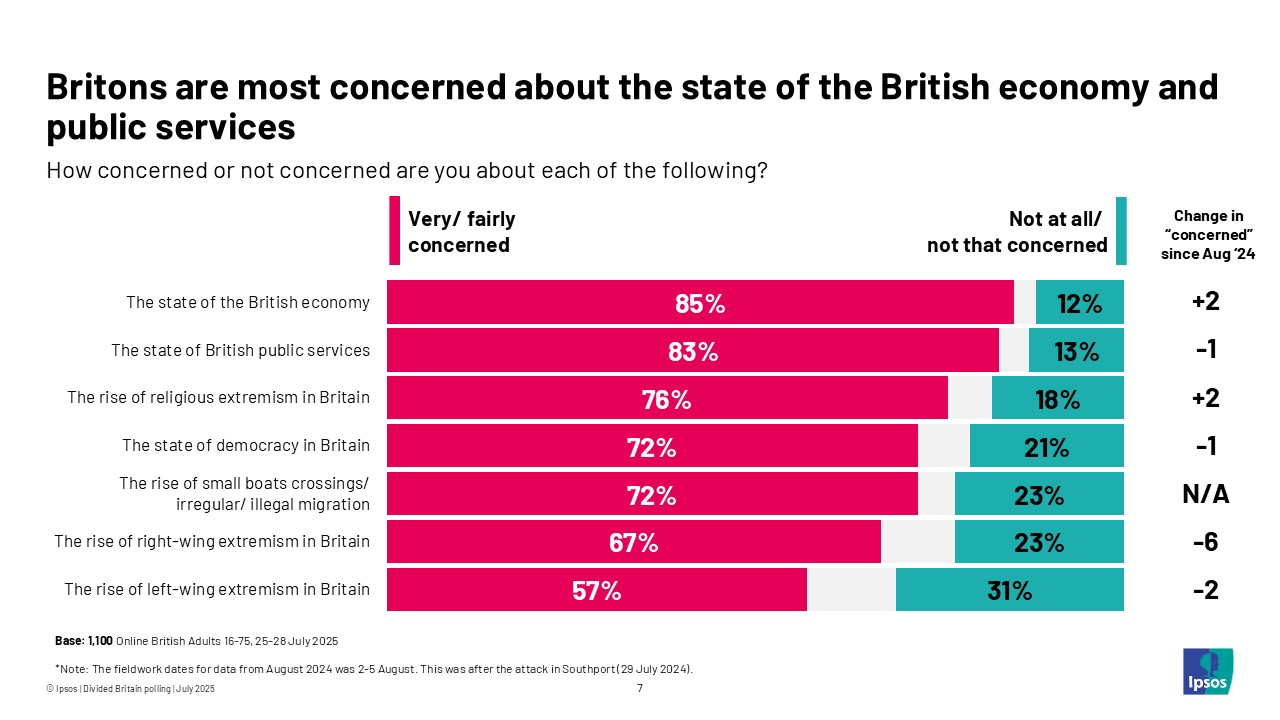A year on from Southport and subsequent riots, 8 in 10 continue to say Britain is divided
New polling from Ipsos in the UK reveals that, a year on from the attack in Southport and subsequent riots, a stark 81% of the British public continue to believe society is divided – a figure that has not changed hugely over the last seven years.

The data reveals that while the feeling of division is widespread, it is not felt equally strongly across all demographics. Nine in ten (91%) of those aged 55-75 perceive British society as divided, compared to just 69% of 16-34-year-olds. Politically, supporters of Reform UK (90%) are the most likely to see society as divided (compared to 78% of Labour voters and 82% of Conservative voters).
Key findings:
- Immigration seen as the main point of tension: When asked to identify the greatest source of tension in Britain today, three in five (61%) point to divisions between "immigrants and people born in Britain." This represents a 9 ppt increase from a year ago before the Southport attacks, when it was 52%. Other notable tensions include those between different ethnicities (40%), the rich and poor (39%), and people with different political views or different religions (both 37%).

- Growing concern over violence: There is a rising fear about how disagreements are handled. 80% of Britons are concerned about people "resorting to violence instead of coming together peacefully to solve our disagreements," a notable increase from 71% who felt this way in July 2024 before Southport. Similarly, 78% are concerned about "acts of violence throwing this country into chaos," up from 67% last year. There is concern both about acts of violence being committed against immigrants and about Britons not being able to protest about their legitimate concerns (71% and 72% respectively). However, Britons are not certain whether mob rule is replacing democratic rule (38% think it is, 24% not, and 39% neutral or don’t know).

- Politicians judged harshly on uniting the country: The public is critical of the role of political leaders in healing these divides. A clear majority (58%) believe that "politicians in general" are doing a bad job at encouraging people from different backgrounds and with different beliefs to get on well together. Social media companies are also viewed negatively, with half (50%) stating they are doing a bad job. Prime Minister Keir Starmer is seen as doing a bad job by 47% of the public, while 45% say the same of Reform UK Leader Nigel Farage.
- Economy and public services remain top concerns: The most pressing concerns for the public remain the state of the British economy (85% concerned) and the state of British public services (83% concerned). Three quarters (76%, similar to August 2024 just after the Southport attacks and riots) say that the rise of religious extremism is a concern, and 72% are concerned about the rise of small boat crossings/illegal immigration (72%).

Commenting on the findings, Gideon Skinner, Senior Director of UK politics at Ipsos, said:
One year on from the horrific attack in Southport and riots and unrest that followed, these figures paint a picture of a nation that still sees itself as divided. While belief that Britain is divided has been high for years, the last year has seen an increasing focus on the tensions between immigrants and the British-born. There are high levels of concern both about small boat crossings and illegal immigration, Britons being prevented from protesting about their legitimate concerns, and over the impact of acts of violence on immigrants themselves. At the same time, day-to-day worries about the economy and our public services remain at the forefront of people's minds.
There is a clear and growing anxiety about the potential for violence to replace peaceful debate. The challenge for political leaders, who the public feel are currently failing to bridge these gaps, is to address these fears and find a way to foster greater social cohesion.
Technical note:
- Ipsos interviewed a representative sample of 1,100 adults aged 16-75 across Great Britain. Polling was conducted online between the 22nd-24th July.
- Data are weighted to match the profile of the population. All polls are subject to a wide range of potential sources of error.




